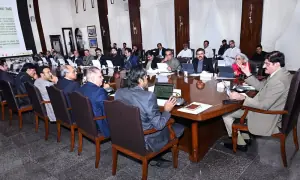Framers of Constitution can dissolve ECP if they wish: CJP Isa
6 min readThe framers of the Constitution established the Election Commission of Pakistan as an institution that can be dissolved if necessary, Chief Justice of Pakistan Qazi Faez Isa remarked on Tuesday as the Supreme Court reserved its decision regarding the formation of the Punjab Election Tribunal.
On Tuesday, a five-member larger bench led by CJP Isa heard the case challenging the Lahore High Court’s decision regarding the formation of election tribunals. Other members of the bench are Justices Amid-Ud-din Khan, Jamal Khan Mandokhail, Naeem Akhtar Afghan, and Aqeel Ahmed Abbasi.
The hearing saw an objection raised by PTI leader Salman Akram Raja’s lawyer, Hamid Khan, against the presiding judge which was dismissed. Following this, Khan left the courtroom but returned shortly after.
During the hearing, Khan argued that they had objections to the CJP hearing the case. In response, CJP Isa rejected the objection and remarked that if he wished to recuse himself, he could do so.
The CJP asked the lawyer to remain seated, assuring him that he would be heard later. Following this, Khan left the courtroom.
Did ECP and Lahore High Court chief justice settle matters?
Justice Aqeel Abbasi said during the proceedings that, according to the written response from the ECP, the issue had been resolved in consultation with the high court.
The ECP’s lawyer confirmed that the LHC chief justice had maintained four tribunals while the remaining four would be appointed by the ECP. Justice Abbasi noted that it indicated that “matters had been settled” between the ECP and the LHC chief justice.
The lawyer replied in affirmative and added that new four tribunals would now be appointed by the country’s top electoral authority due to changes in the law.
CJP Isa affirms Parliament’s five-year term cannot be extended
CJP Isa remarked that the Parliament’s term was fixed at five years and “cannot be extended.” He noted that cases under stay orders also come before the SC, urging that matters not related to the court should be resolved amicably.
He expressed frustration, stating, “I have been exhausted from making requests, but no one has taken the trouble. We must look at what the Constitution says; it is a book that no one seems willing to read.”
Justice Mandokhel added that while the ECP has authority, the appointment of judges for tribunals occurs in consultation with the high courts.
He emphasised that the high courts’ chief justices were not ordinary individuals and that respect should be afforded to both the ECP and the high courts. He called for an end to preferences in the appointment of judges to tribunals.
CJP stresses judge count should reflect caseload
CJP Isa remarked that the number of judges for tribunals should be determined based on the volume of cases. He emphasised the importance of making decisions about the number of judges in relation to the cases at hand, stating that reducing the number of judges in light of pending cases would be unfair.
“I am not aware of how many cases are pending in Balochistan or Punjab,” he said.
During this time, Salman Akram Raja returned to the courtroom with his lawyer Hamid Khan.
Justice Mandokhel criticises misreporting
Justice Mandokhel commented that it was “incorrectly” stated he was unavailable, which led to delays in the case. He pointed out that the delay was due to Raja’s lawyer being abroad.
CJP Isa remarked on the trend of “inaccurate” reporting, stating, “Falsehoods are told to earn dollars.” He emphasised that the SC does not have a media cell to continuously issue clarifications.
Raja appears at the rostrum
During the hearing, Raja asserted that the ECP should have complied with the LHC’s order and stated that the SC cannot dismiss the matter without a decision based on that ruling.
In response to Raja’s arguments, CJP Isa questioned whether the court should rely on judicial decisions or the Constitution and emphasising that the court was bound by the Constitution and expressing indifference to any judge’s previous ruling.
The CJP then asked the PTI leader if he desired specific judges for the tribunals, noting that if the consultation had already occurred between the LHC and the ECP. “What more needed to be done?” He implied that Raja seemed to want the matter of the tribunals to remain unresolved.
Raja stated that the case could not be concluded without either nullifying or upholding the high court’s order. He stated that the ECP does not have the authority to decide which judge would hear which tribunal case, warning that relying solely on constitutional compliance without judicial decisions could lead to issues in the country.
CJP Isa asked to see the letter written to the LHC chief justice. Raja responded that the LHC chief justice had informed the registrar, indicating that it was the usual mechanism.
The top judge then inquired who had indicated that the high court chief justice wrote a letter to the registrar. He pointed out that the registrar did not comply with the SC judge’s order, suggesting that Raja should understand where he was referencing.
The PTI leader reiterated that the ECP should have acted in accordance with the LHC’s order, stating that the SC cannot dismiss the matter without making a decision based on that ruling.
‘Country needs stability’
During the hearing, CJP Isa remarked that the country needed stability. “We are not enemies; we are residents of the same nation.”
He noted that in the previous hearing, the ECP was sent to the LHC chief justice, highlighting the importance of understanding that institutions communicate through appropriate channels. He criticised the use of informal language in official correspondence, stating that it “is not the right way” to run a country.
The ECP lawyer responded that the issue had been resolved. CJP Isa stressed that decisions regarding electoral matters should be made as quickly as possible.
Justice Mandokhel pointed out that decisions from the tribunals in Balochistan have already started coming in. CJP Isa commented that they too have received cases that have remained pending due to stay orders, noting that the deputy speaker had also obtained a stay order, violating the Constitution. He suggested that perhaps the deputy speaker “is now underground.”
CJP Isa further stated that while disputes arise, it does not justify attacking institutions.
CJP Isa highlights role of ECP and constitutional authority
CJP Isa remarked on the wisdom of the Constitution’s framers, stating that the “Constitution is a complex document that only a wise person can truly understand.”
He noted that the framers established the ECP as an institution and they have the power to abolish it if they choose. “For now, the Election Commission is a constitutional body,” he said and raised concerns about what would happen if the high court were to start electoral work.
Also, read this
Battle over Practice and Procedure Ordinance heats up, challenges filed in courts
PTI approaches SC for clarification on NA speaker’s letter to ECP
Following the discussion, the court reserved its decision on the case concerning the formation of election tribunals in Punjab, which would be announced later.
The top judge indicated that a brief decision would not be issued today (Tuesday), urging the ECP to promptly issue notifications for the tribunals. He questioned the implications if the high court were to begin electoral work, reiterating that the primary responsibility of the ECP is to conduct elections.
He concluded by stating that any disputes arising would be resolved by the high court.
For the latest news, follow us on Twitter @Aaj_Urdu. We are also on Facebook, Instagram and YouTube.

























Comments are closed on this story.